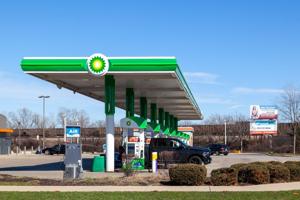(The Center Square) – Proposed legislation that directs two Illinois agencies to assign state-mandated “deficits” to gasoline is being criticized by an industry group, which argues the measure would further increase the price of a gallon of gas.
Senate Bill 1556 from state Sen. Dave Koehler, D-Peoria, would mandate two state regulators, the Illinois Environmental Protection Agency and the Illinois Pollution Control Board, to establish a “clean transportation standard” and reduce the use of carbon-based fuels by Illinois drivers on the state’s roads.
The two agencies would assign state-mandated “deficits” to fossil fuels like gasoline and diesel.
The Illinois Fuel and Retail Association, on behalf of more than 4,000 gas stations, convenience stores and truck stops across Illinois who serve millions of customers, opposes the proposal.
“Having the No. 1 gas tax in the nation, Illinois, my members and certainly motorists here can’t afford it,” IFRA CEO Josh Sharp said.
Sharp notes that Illinois doubled the gas tax in 2019 and has raised it every year since then. As a result, Illinois topped California for the highest total taxes on gasoline in the country last year. In addition to more than doubling the state’s gas tax, which now stands at 39.2 cents per gallon, Illinois assesses its 6.25% sales tax on top of every dollar spent on gasoline, including the gas tax.
The U.S. Energy Information Administration shows as of Jan. 1, 2023, Illinois had the highest combined taxes in the country at 67.4 cents per gallon.
Sharp said similar clean transportation standards, or low-carbon fuel standards, have been a disaster for fuel consumers in other states.
“Only three states have such a policy right now, Oregon, Washington and California,” Sharp said. “Two out of those three states openly admit that this policy increases the cost of gasoline. We’re opposed to that.”
According to AAA, the average price for a gallon of gas in Illinois is $3.70, by far the highest in the Midwest. In neighboring Missouri, a gallon of gas averages $3.19, and in Kentucky, it is $3.11.
“Illinois cannot control geopolitical strife, OPEC export rules, economic pressures or other global policies and factors that largely drive the costs we pay at the pump,” Sharp said. “But we can do our part by rejecting policies out of Springfield that artificially and needlessly cause consumers more pain every time they fill up.”
Catrina Petersen contributed to this report.







